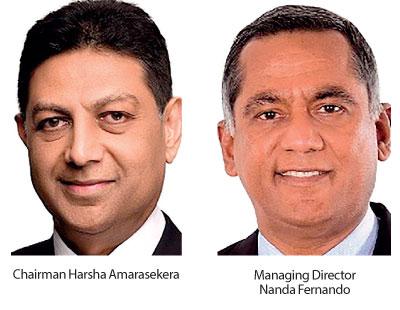15 Aug 2022 - {{hitsCtrl.values.hits}}
Amid a challenging economic environment, Sri Lanka’s third largest private lender in terms of assets, Sampath Bank PLC saw a marginal growth in earnings for the quarter ended June 30, 2022 (2Q22) as the banking group had to provide heavily for possible loan losses in sovereign debt instruments it held.
Bank PLC saw a marginal growth in earnings for the quarter ended June 30, 2022 (2Q22) as the banking group had to provide heavily for possible loan losses in sovereign debt instruments it held.
The bank reported consolidated earnings of Rs.2.20 per share or Rs.2.5 billion compared to earnings of Rs.2.11 per share or Rs.2.4 billion reported for the same period last year.
The bank’s bottom line was helped by significantly lower income tax expense of Rs.295.4 million compared to Rs.1.06 billion income tax expense incurred for the same period last year.
Aided by higher interest rates, the banking group’s interest income rose 57.7 percent year-on-year (YoY) to Rs.35.9 billion while interest expenses rose 47 percent YoY to Rs.17.5 billion, resulting in a net interest income of Rs.18.4 billion, up 69.5 percent YoY. The net interest margin was maintained at 4.58 percent.
The net fee and commission income, mainly driven by the bank’s card business, rose 60.7 percent YoY to Rs.4.1 billion.
The bank incurred a trading loss of Rs.2.1 billion for the quarter compared to a gain of Rs. 444.3 billion a year ago, while recorded a net other operating income of Rs.7.4 billion compared to Rs.749 million a year ago due to the sharp depreciation of the rupee against the dollar.
The impairment charge for the period was Rs.16.4 billion, up from just 4.2 billion a year ago and for the first half such charges rose to a whopping Rs.28.5 billion, up from Rs.5.8 billion from the same period last year.
While the lion’s share of the provisions accounted for possible bad loans stemming from the pandemic-affected borrowers, the bank provided Rs.7 billion against Sri Lanka issued international sovereign bonds (ISBs) and Rs.11.8 billion against Sri Lanka Development bonds. “This decision was influenced by the downgrade in Sri Lanka’s sovereign rating in May 2022 to RD from C by Fitch Ratings and other current debt restructuring actions taken by the government,” Sampath Bank said in an earnings note. The bank’s bad loans ratio rose slightly to 3.31 percent from 3.20 percent six months ago signalling a marginal deterioration in the asset quality. Meanwhile, the total operating expenses of the banking group rose to Rs.7.6 billion for the quarter under review, up 29.2 percent YoY amid higher inflation prevailing in the economy. At the end of June 2022, Sampath Bank’s total assets surpassed Rs. 1.3 trillion, denoting an increase of Rs. 122 billion (annualised growth of 20.2 percent) from Rs. 1.2 trillion as of 31st December 2021. Increases in net loans & advances and cash & cash equivalents have contributed towards the above. Devaluation of the local currency that took place in 1H22 has increased the rupee value of foreign currency denominated assets which could be cited as a main reason for the balance sheet growth. If the impact of the currency fluctuation is eliminated, the bank would have recorded an annualised growth of approximately 5 percent. Total advances grew by 29.7 percent (annualised) in 1H22 to reach Rs.933 billion as at 30th June 2022, up from Rs. 813 billion at the end of December 2021. The rupee loan book expanded by 13.6 percent (annualised). It should be noted that following the rupee depreciation of Rs. 160.25 against US dollar during the period, the value of foreign currency denominated loans increased significantly.
If currency rate fluctuations were eliminated, the bank’s total loans and advances would have increased by 9.8 percent (annualised) during the period.
Further, the bank transferred Treasury Bonds worth Rs. 33 billion classified under FVOCI to amortised cost during the reporting period as permitted by the SoAT on Reclassification of Debt Portfolio issued by CA Sri Lanka. The bank’s rupee deposit portfolio contracted by 9.24 percent compared to the figure reported at the end of 2021. This was due to the fact that the bank had adequate liquidity throughout the period and therefore, deposit mobilisation activities were not actively pursued in 1H22.
At the conclusion of the first half of 2022, the bank’s CASA ratio stood at 40.6 percent. However, the bank resumed deposit mobilisation during the month of July 2022 by offering products under new tenors at competitive market rates.
Meanwhile, the bank said a surcharge tax of Rs 2.67 billion was recognised against the opening retained earnings of the bank. Throughout the first half, the bank maintained all of its capital ratios well above the regulatory minimum requirements. The bank’s CET 1, Tier 1, and total capital ratios on 30th June 2022 were 11.3 percent, 11.3 percent, and 13.82 percent respectively, in comparison with 13.95 percent, 13.95 percent, and 17.02 percent at the end of 2021.
Sampath Bank said the decline in the ratios during the reporting period is due to the combined impact of increase in risk-weighted assets resulting from the depreciation, the payment of cash dividends and surcharge tax.
Business magnate Dhammika Perera-controlled Vallibel One PLC owns 14.95 percent stake in Samapth Bank while Prabhash Subasinghe-controlled Ayenka Holdings has 9.97 percent stake in the lender as the second largest shareholder.
The Employees’ Provident Fund (EPF) also has 9.97 percent stake in the bank.
07 Nov 2024 14 minute ago
07 Nov 2024 32 minute ago
07 Nov 2024 1 hours ago
07 Nov 2024 2 hours ago
07 Nov 2024 2 hours ago